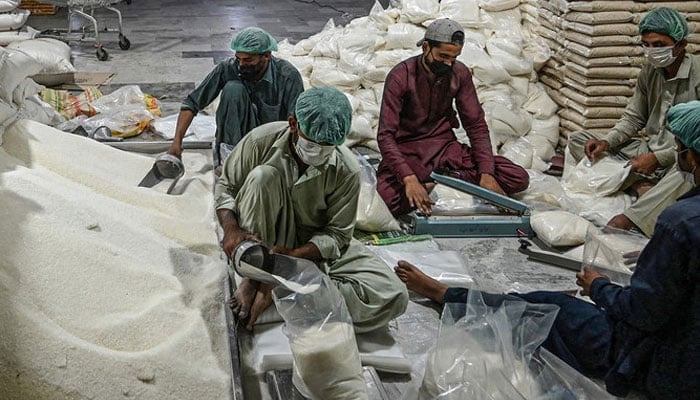To check tax evasion: Sugar mills to be under strict govt surveillance
Sugar industry is considered a political industry owned by all political elites irrespective of any political divide
ISLAMABAD: By invoking powers under Section 40-B of the Sales Tax Act, the Federal Board of Revenue (FBR) has deputed 280 officers to all sugar mills across the country to monitor their production to curb billions of rupees tax evasion.
The sugar industry is considered a political industry owned by all the political elites irrespective of any political divide; there are many owners belonging to the Pakistan Muslim League-Nawaz, Pakistan Peoples Party and Pakistan Tehreek-e-Insaf.
The prime minister has granted powers to the Intelligence Bureau (IB) to keep strict surveillance over FBR’s designated monitoring officers on sugar mills as there is an alleged nexus. It is feared that Sales Tax evasion of over Rs30 to 40 billion takes place on an annual basis.
After receiving instructions from the prime minister, the FBR has devised three-pronged strategy, including invoking 40-B of the Sales Tax Act, for deputing monitoring officers on sugar mills, effective placement of Track & Trace System (TTS) and assignment of officers for further monitoring of deputed officers.
As per the FBR estimates, out of the total production of 6.7 million tons sugar, the sales tax, which is 18 percent, should be Rs130 to Rs140 billion on an annual basis. However, the FBR’s collection stands at around Rs90 to Rs100 billion. There is not much input involved except sugarcane and electricity, so there is no other way but to ensure proper monitoring of production for avoiding tax evasion.
An official said that the TTS was installed at 80 sugar mills but the FBR fears that there is still risk of sugar bags being sent without TTS stamps. Without effective enforcement, the FBR cannot plug leakages of billions of rupees despite installment of TTS.
-
 Savannah Guthrie Sends Desperate Plea To Mom Nancy Kidnapper
Savannah Guthrie Sends Desperate Plea To Mom Nancy Kidnapper -
 NBA All-Star 2026 Shake-up: Inside The New USA Vs World Tournament Format
NBA All-Star 2026 Shake-up: Inside The New USA Vs World Tournament Format -
 Warner Bros Consider Reopening Deal Talks With Paramount, Says Reports
Warner Bros Consider Reopening Deal Talks With Paramount, Says Reports -
 Andrew Mountbatten Windsor Faces Future With UK MPs, Says Expert
Andrew Mountbatten Windsor Faces Future With UK MPs, Says Expert -
 Shamed Andrew Told 'nobody Is Above The Law' Amid Harrowing Silence
Shamed Andrew Told 'nobody Is Above The Law' Amid Harrowing Silence -
 Gisele Bundchen Melts Hearts With Sweet Bike Ride Glimpse Featuring Son
Gisele Bundchen Melts Hearts With Sweet Bike Ride Glimpse Featuring Son -
 Prince William Found Meghan Markle ‘quite Refreshing’ At Start
Prince William Found Meghan Markle ‘quite Refreshing’ At Start -
 Kate Middleton Knew Should Could Not Be ‘voice Of Reason’ With Prince Harry
Kate Middleton Knew Should Could Not Be ‘voice Of Reason’ With Prince Harry -
 Rihanna Has Wardrobe Malfunction At A$AP Rocky Fashion Show
Rihanna Has Wardrobe Malfunction At A$AP Rocky Fashion Show -
 Prince Harry Felt System Had ‘one Rule For Him, One For Prince William’
Prince Harry Felt System Had ‘one Rule For Him, One For Prince William’ -
 Jake Paul's Fiancée Sends Him Over The Moon Over Stunning Victory
Jake Paul's Fiancée Sends Him Over The Moon Over Stunning Victory -
 Harper Beckham Sends Valentine’s Love Amid Brooklyn Family Drama
Harper Beckham Sends Valentine’s Love Amid Brooklyn Family Drama -
 Why Prince William, Kate Middleton 'partnership' Is Important For Monarchy
Why Prince William, Kate Middleton 'partnership' Is Important For Monarchy -
 Katie Price Drama Escalates As Family Stays In Touch With Ex JJ Slater
Katie Price Drama Escalates As Family Stays In Touch With Ex JJ Slater -
 Critics Target Palace Narrative After Andrew's Controversy Refuses To Die
Critics Target Palace Narrative After Andrew's Controversy Refuses To Die -
 Sarah Ferguson’s Delusions Take A Turn For The Worse: ‘She’s Been Deserted’
Sarah Ferguson’s Delusions Take A Turn For The Worse: ‘She’s Been Deserted’




